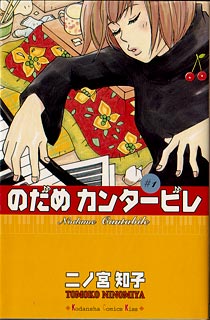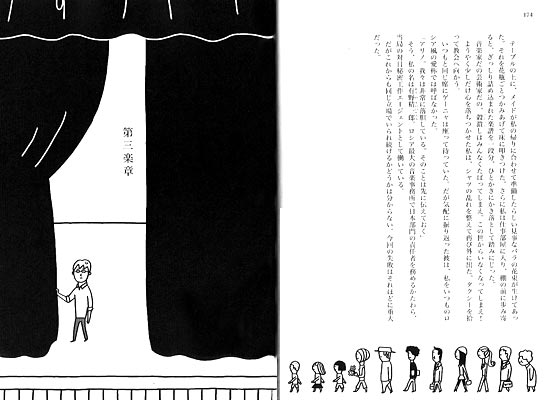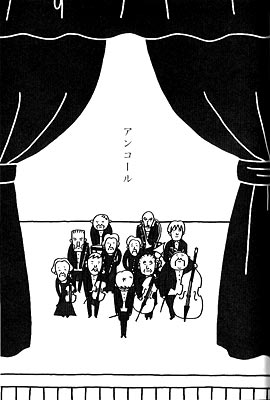- Life top
- Daily Life
- Applying for LINE stickers
- Exhibition of Matsumoto-sensei
- Hana - Shiba-Inu
- Elec. handicraft & Akihabara
- Supermarkets in the area
- Takaido Civic Center
- Building a house
- Horrible dentists
- Judo therapy
- In an elderly care home
- Parties
- Cosplay bonenkai 2010
- Gainax cosplay bonenkai
- Friends from Gainax
- Friends from schooldays
- Party at Bar Espion
- Home party with cheese
- Music Life
- TARO Quartet
- Maeda-san - violin maker
- Chigusa Kindergarten
- Seniors playing music
- My viola debut
- Torakyo regular concert
- Toranomon Orchestra
- Four seasons
- Shrine visit of the New Year
- New Year´s postcard
- Snowfall in Tokyo
- Hina-matsuri and hina-dolls
- Sakura - cherry-blossom
- Sakura - what I missed most
- Fireworks Festival
- People
- Itakura - his adventurous life
- Naoto - his country life
A novel on seniors playing music

The cover of "Oke roujin". Please place your mouse point on the picture, so as to display the real monochrome cover.
The colorful part is a paper belt often used for books in Japan and serves as advertisement space of the book. In this case, the left space is used for the reproduction of praises for the book by famous people. The right space describes the relations between important characters of the novel.

The cover of the first band of the series "Nodame cantabile".

The novel is divided into four "movements" instead of sections. This is the last page of the second movement and the cover of the third movement. Texts of the most Japanese literatures are printed from right to left and top to bottom.

Encore
 "Oke roujin" is the title of a popular novel I have just read and means "old people playing in an orchestra".
"Oke roujin" is the title of a popular novel I have just read and means "old people playing in an orchestra".Recently manga novels dealing with classical music have been booming in Japan. Because of the first great hit of the classical music manga, "Nodame cantabile" (*), classical concerts attract more visitors and some music titles, for example Beethoven's Symphony No.7, which are played in the novel, are repeatedly performed by both professional and amateur orchestras. It is certain that this new boom of manga about the classical music world and TV dramas based on original manga have increased the visitors to classical concerts. "Nodame cantabile" has indeed served as an epoch-making event for both manga and classical music in Japan.
- (*)
- "Nodame cantabile" by Tomoko Ninomiya is a manga series started in 2001 and the most popular book of this category of manga. The heroin "Nodame" - nick name of Noda Megumi - is musically a genius but in her behavior eccentric and lovely at the same time. The comical but heart throbbing relationship of Nodame with Chiaki, equally a genius but, in contrast, a very serious young conductor, is in the center of the novel.
- (**)
- Such as "Prodigy" by Akira Sasou and "The perfect world of Kai" by Makoto Issiki.
- (***)
- There is a place name "Umegaoka" not far from my house, along Odakyu line. But, the Chinese character for "oka" is different, and there is only a "Junior Philharmonic" in the real "Umegaoka".
This "Oke Roujin" has also potential enough to be filmed in the future. I think, "Oke Roujin" will be a unique film, because seniors must then play important roles in a very positive and promising way, especially as we are rather used to see the issue of aging in a negative and hopeless way.
In relation to the issue of aging, the title "Oke Roujin" sounds somewhat ironical for me, because it sounds similar to "Boke roujin" and in fact I misread it in this way, when I saw it first. "Boke roujin" means "slow old people" or "demented seniors" and is by no means a sympathetic expression, but it was often used (****) to describe slow or demented seniors. In fact all those old members of USO are in one way or the other affected by aging; one lady violinist even lives in a special nursing home.
- (****)
- Now such expression is less used, at least in the public, because it offends the humanity in a person concerned.
In real life, all senior members of amateur orchestras face a dilemma; they want to continue playing, but their aging makes it more and more difficult for them to play properly. Torakyo has a good mixture of young and old members, because some old members voluntarily quit musical activities when they recognize their limit.
The other orchestra to which I belong has a situation similar to Umegaoka Symphony Orchestra. However, I think, it is very good that old people enjoy music, even though they are not accomplished. I got acquainted with an old lady, who started to learn violin late in life and cannot properly play the second violin part in Beethoven's 8th Symphony. For example, she cannot play the triplets in the final movement, because they are TOO FAST. She also omits some notes, as it is TOO CLUMSY to play all notes. Beethoven would certainly be surprised, if he knew that his notes are sometimes omitted and simplified. However, she is always cheerful and enjoys playing music. Recently she had an accident and broke her left meniscus. But, she continues to come to rehearsals with a walking stick and enjoys music. She knows what is important in music. I sometimes advise her on technical points like fingering, but I am learning much more from her, just as Mr. Nakajima learns from the old members of USO.